Using the focus keyphrase for product pages in Yoast SEO

SEO is crucial for any online store. One key aspect that Yoast SEO needs to help you improve the SEO of your product pages is a focus keyphrase. This guide will help you find and fill in the proper focus keyphrase using Yoast SEO.
Understanding the focus keyphrase
The focus keyphrase is the main keyword or phrase that you want your product page to rank for in search engine results. It represents the core topic of your product pages. Usually, this is what you expect potential customers to type into search engines when looking for products similar to yours.
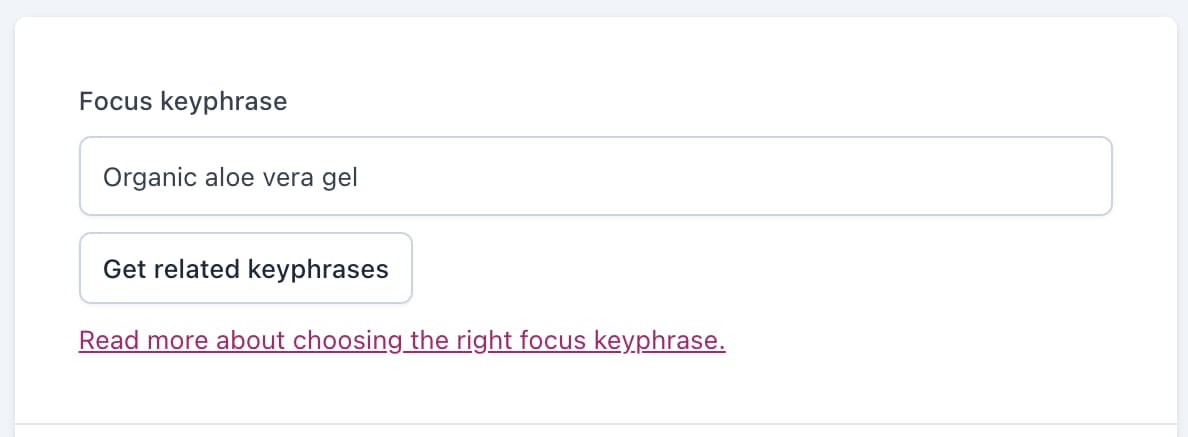
Why is the focus keyphrase important?
The focus keyphrase helps search engines understand the subject of your product page. When search engines crawl your product pages, they look for word patterns to determine what your page is about. By optimizing your product page around a specific keyphrase, you make it easier for search engines to index and rank your products accurately. As a result, your customers can find your products in the search results.
Filling in a focus keyphrase in Yoast SEO helps you optimize your product pages based on provided feedback. This might improve your product page’s search engine ranking. Higher rankings mean more visibility, leading to increased organic traffic and, ultimately, more sales. A well-chosen focus keyphrase ensures that your product page is relevant to what users are searching for.
Yoast SEO algorithms
Yoast SEO, Yoast WooCommerce SEO, and Yoast SEO for Shopify use algorithms to analyze your product pages based on the focus keyphrase you fill in. It checks if the descriptions you wrote for your products correctly use these keywords. This includes examining the keyphrase’s presence in the title, meta description, URL, headings, body content, and more. The tool gives feedback and suggestions to improve your ecommerce SEO.
Benefits of using a focus keyphrase in Yoast SEO
Using focus keyword phrases in Yoast SEO is essential, as it has many benefits, such as getting more targeted traffic. Optimizing for a specific product keyword attracts visitors specifically looking for your offer, increasing the likelihood of conversion.
A well-researched focus keyphrase can give you an edge over competitors who may not optimize their pages as effectively. Tracking the performance of your focus keyphrases helps you measure the effectiveness of your ecommerce SEO strategy. Based on performance data, you can refine and adjust your keyphrases.
An example: “Organic aloe vera gel”
Suppose you are selling “Organic aloe vera gel.” Your focus keyphrase might be “Organic aloe vera gel.” This keyphrase should be used consistently across your product title, meta description, URL, headings, and body content to ensure search engines understand the page’s relevance to users searching for organic aloe vera gel.
Understanding and using the focus keyphrase for product descriptions can enhance your online store’s SEO. As a result, your products will be more discoverable to potential customers.
How to determine the focus keyphrase for your products
Finding the right focus keyphrase involves understanding your product, keyword research, and analyzing its effectiveness. Here’s a step-by-step approach:
Step 1: Identify the product’s main features and benefits
Start by listing the primary features and benefits of your product. This will help you understand what makes your product unique and appealing.
Example:
- Product: Organic aloe vera gel
- Features: Organic, soothing, hydrating
- Benefits: Soothes irritation, hydrates skin, suitable for sensitive skin
Step 2: Brainstorm potential keywords
Think of keywords and phrases a customer might use to find your product. Include broad terms as well as more specific, long-tail keywords. Head keywords are general descriptions of your product, while long-tail keywords are more specific and often less competitive.
Example:
- Head keywords:
- “Aloe vera gel”
- “Skincare gel”
- Long-tail keywords:
- “Organic aloe vera gel”
- “Natural aloe vera gel”
- “Aloe vera gel for sensitive skin”
- “Soothing aloe vera gel”
Step 3: Use keyword research tools
You can use keyword research tools to analyze the potential keywords you brainstormed. These tools can provide insights into search volume, competition, and related keywords. There are many tools out there, and you might have already picked a favorite. Popular tools are Semrush, Ahrefs, Ubersuggest, and Moz, but you can even ask ChatGPT to help you find good product keywords.
Step 4: Analyze and select the best keyphrase
Once you have everything, you can select the best one. Choose a keyphrase that is highly relevant to your product, has a good search volume, the proper search intent, and is not overly competitive. Also, ensure the keyphrase aligns with your customers’ language and terminology.
Focus keyphrase vs. related keyphrases
The main focus keyphrase is the primary keyword you want your product page to rank for. It is the central topic of your content and should be used consistently across various SEO elements. For example, for the product “Organic aloe vera gel,” the main focus keyphrase could simply be “Organic aloe vera gel.”
Related keyphrases are secondary keywords closely related to the main focus keyword. They help broaden the scope of your content and capture additional search queries that your main keyword might miss. Related keyphrases add context and relevance, making your product content more comprehensive and improving your chances of ranking for multiple related terms.
For example, for the main focus keyword, “Organic aloe vera gel,” related keyword phrases could be “Natural aloe vera gel,” “Aloe vera gel for sensitive skin,” or “Hydrating organic aloe vera gel.”
Keyphrase synonyms in Yoast SEO
Keyphrase synonyms are alternative words or phrases with the same or similar meaning as your main focus keyword. Diversifying the language used on your page helps you cover a broader range of search queries, enhances the natural flow of your product descriptions, and avoids keyword stuffing.
For instance, aloe vera moisturizer could be an alternative to the main keyword, aloe vera gel. You could use this to enhance your product descriptions and use more words to rank for:
“Our organic aloe vera gel is perfect for those seeking a natural skincare solution. This natural aloe vera gel hydrates and soothes your skin, acting as an effective aloe vera moisturizer. This soothing aloe gel is ideal for sensitive skin and provides instant relief from irritation.”
Search engines use semantics to understand the context and intent behind queries. Using related keyphrases and synonyms helps search engines better understand your product descriptions and match them to relevant queries.
Additional tips for selecting a focus keyphrase
Of course, you can do more to choose a good focus keyphrase for the products in your ecommerce store.
- Consider user intent: Consider what the user is looking for when searching for your keyphrase. Ensure your keyphrase aligns with their intent.
- Look at competitors: Analyze your competitors’ keyphrases. This can give you insights into what is working in your industry.
- Use variations: Include synonyms and related terms in your content to cover a broader range of search queries.
Using branded keywords
If you want to rank products by their brand and model, the approach is slightly different but follows the same principles. When optimizing for branded products, start by identifying the brand and model names, as these are often the terms customers use in their searches.
Use keyword research tools to analyze these branded terms for search volume and competition. Look at how competitors are ranking and the specific keywords they are targeting. Consider long-tail variations, including the brand and model, such as “Nike Pegasus 39 Shield women’s weatherized road running shoes”. These long-tail keywords are often less competitive and more specific, attracting highly targeted traffic.
By combining the brand name with descriptive terms, you can create a comprehensive list of focus keyphrases that will help your product pages rank higher in search results and meet the search intent of potential customers.
An example project
Here’s an expanded example of how to find and implement focus keyphrases and related keyphrases for an “Organic aloe vera gel” product using Yoast SEO:
Example: Organic aloe vera gel
| Main focus keyphrase | Related keyphrases |
| Organic aloe vera gel | Natural aloe vera gel |
| Aloe vera gel for sensitive skin | |
| Soothing aloe vera gel | |
| Hydrating aloe vera gel |
Step-by-step implementation in Yoast SEO
- Enter focus keyphrase in the respective Yoast SEO field
Enter the main focus keyphrase “Organic aloe vera gel” in the focus keyphrase field in Yoast SEO.

- Enter the related keyphrases
If applicable, enter the related keyphrases in their respective fields.
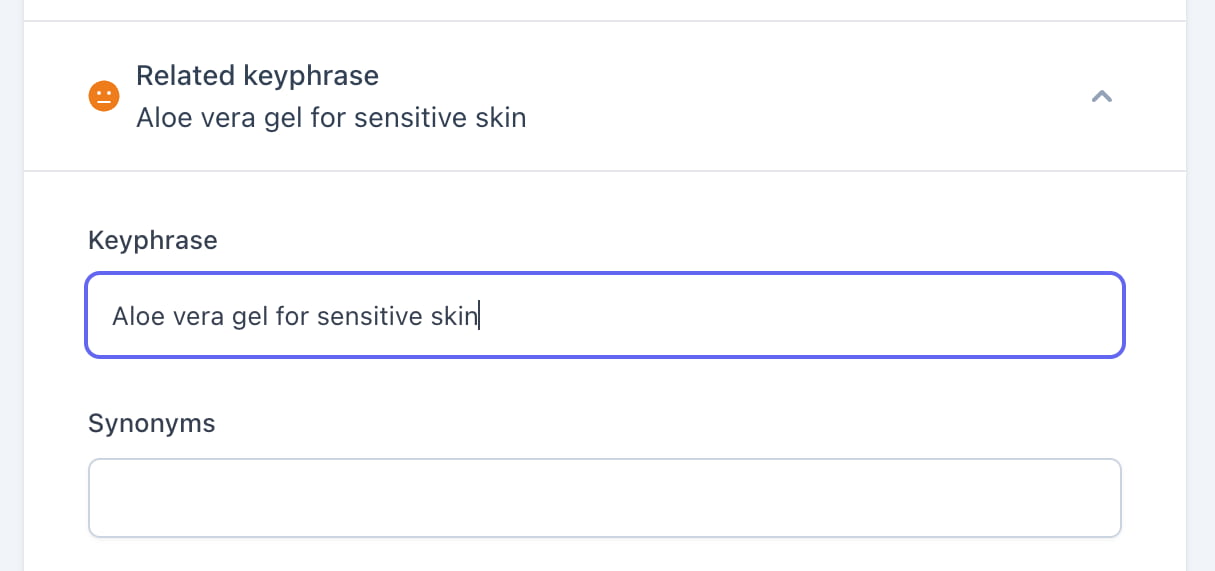
- Title tag: Use the main focus keyphrase in the product title
Example: “Organic aloe vera gel – Natural soothing and hydrating skincare”

- Meta description: Craft a meta description including the main focus and related keyphrases
Example: “Discover our organic aloe vera gel, a natural solution for soothing and hydrating your skin. Perfect for sensitive skin, this gel provides instant relief and hydration”

- URL slug: Ensure the URL slug contains the main focus keyphrase
Example: yourstore.com/products/organic-aloe-vera-gel/

- Headings: Include the main focus keyphrase in the H1 and the others in subsequent headers
For example, the H1 would be “Organic aloe vera gel,” the H2’s “Natural aloe vera gel benefits,” “Soothing aloe vera gel for sensitive skin,” and “Hydrating aloe vera gel for daily use”
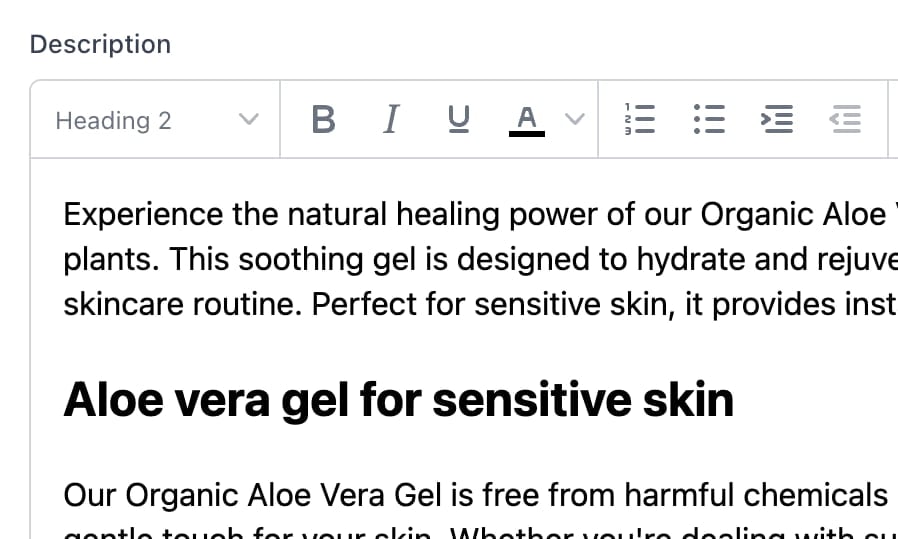
- Body content: Use keyphrases naturally in the product description + lists
Example, although this is too short based on our advice: “Our organic aloe vera gel is crafted from the finest organic aloe plants, ensuring a soothing and hydrating experience for your skin. This gel provides natural relief from irritation and dryness and is ideal for sensitive skin. Use our natural aloe vera gel daily to keep your skin hydrated and healthy. The soothing properties of this gel make it perfect for calming red or irritated skin, while its hydrating effects ensure your skin stays moisturized all day long.” Don’t forget to add lists!

- Image alt text: Use the keyphrases to describe the product images
For example: “Organic aloe vera gel bottle,” but try to make it descriptive about what’s in the image
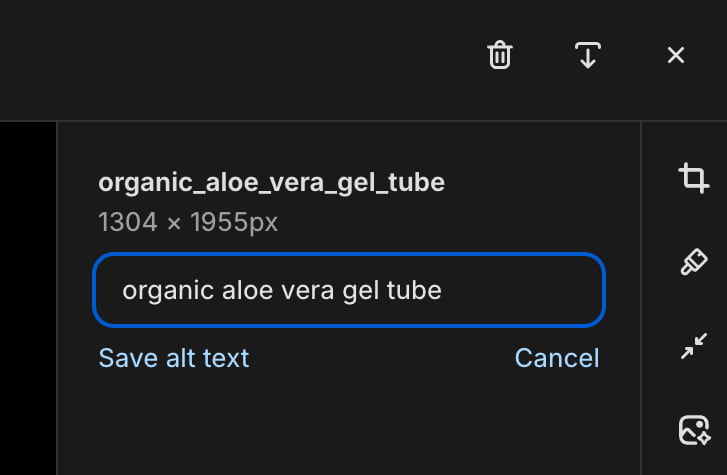
- See whether Yoast SEO finds your keyphrases
Ensure Yoast SEO checks for the keyphrase in the title, meta description, URL, headings, and body content.
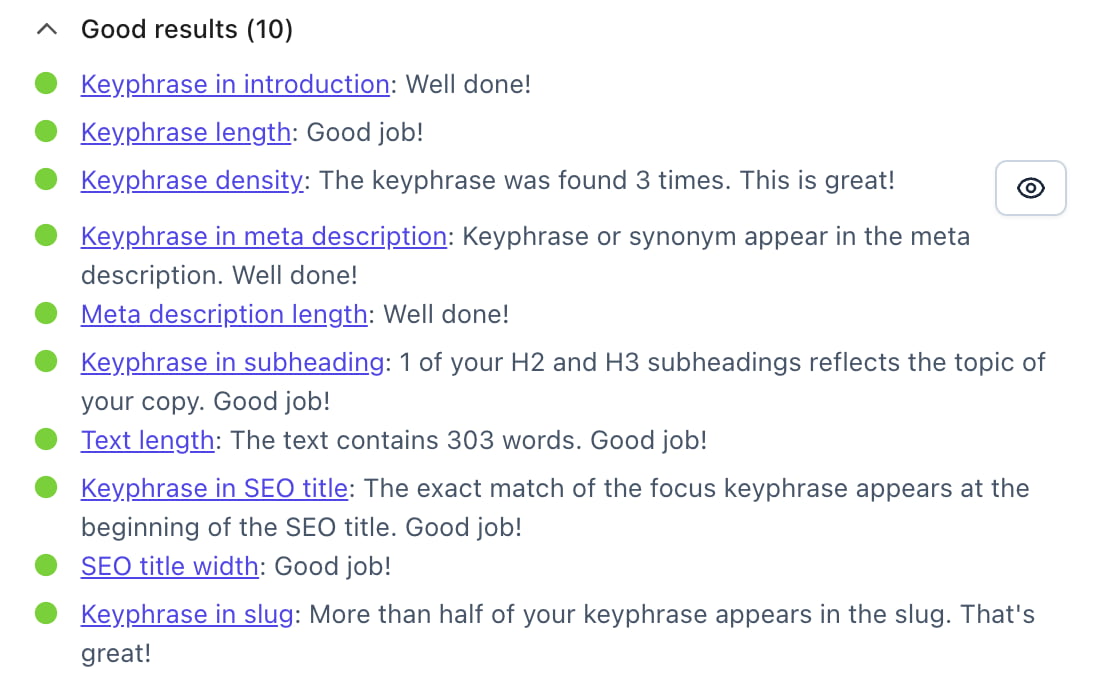
- Check the feedback from Yoast SEO
Review the feedback provided by the plugin and make any necessary adjustments to improve the SEO score. Remember that the SEO analysis shows all you can do to improve your product’s findability in the search results. On the other hand, the readability analysis helps you make the product content as understandable as possible, which is good for search engines and users.
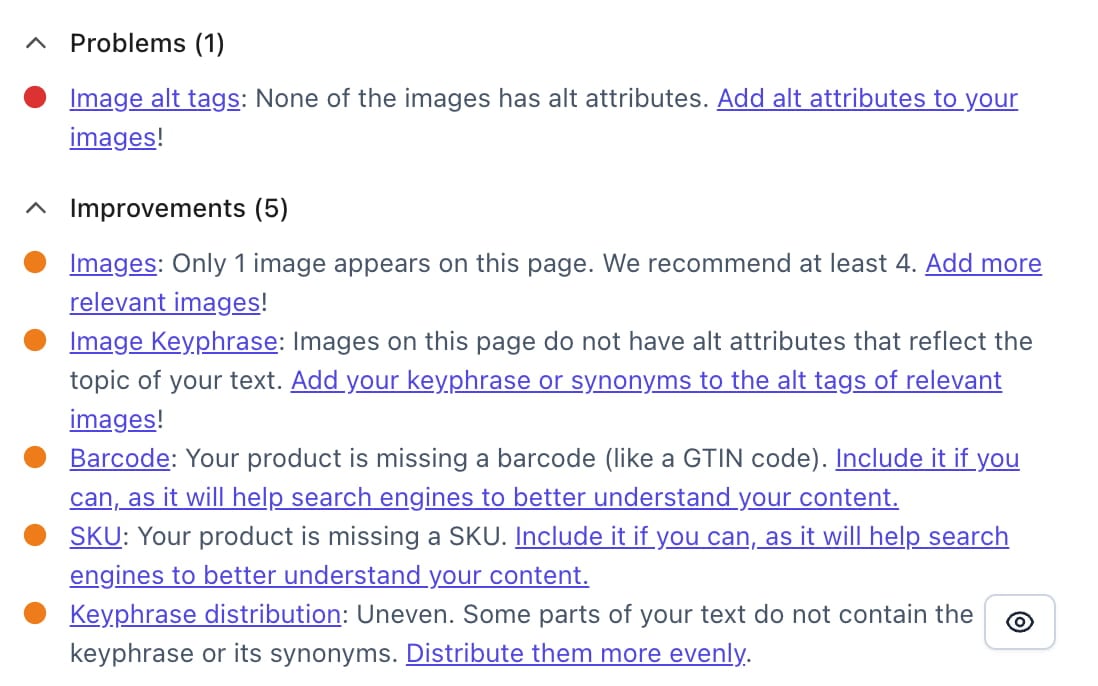
How to use focus keyphrases in Yoast SEO
By following these steps and effectively using the main focus keyword and related keyword phrases, you can optimize your product page for better search engine visibility and attract more targeted traffic to your online store.

